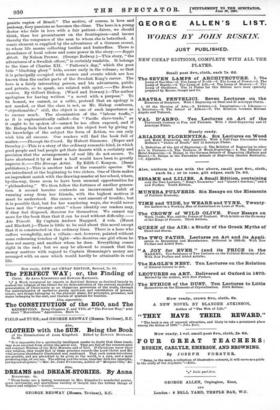Abbott. By Nelson Prower. (George Redway.)—This story, " the adventures
of a Swedish officer," is certainly readable. It belongs to the time of Charles XII. " Pultowa's day," which the poet bids " blushing glory" hide, occurs early in the volume; so that it is principally occupied with scenes and events which are less known than the earlier parts of the Swedish King's career. The hero is a fairly interesting person, and his adventures, public and private, so to speak, are related with spirit.—The Beach- combers. By Gilbert Bishop. (Ward and Downey.)—The author apologises for having written " a novel with a purpose." To be honest, we cannot, as a critic, pretend that an apology is not needed, or that the class is not, as Mr. Bishop confesses, " objectionable ;" still, the object is one of such importance as to excuse much. The abomination of the " labour traffic," as it is euphemistically called—the " Pacific slave-trade," as it ought to be spoken of—cannot be too often exposed, and if Mr. Bishop feels that he can attain his object best by giving to his knowledge of the subject the form of fiction, we can only wish him all success. Our readers will find the book full of matter.—Through the Crowd. By Hubert Simmons. (Roper and Drowley.)—This is a story of the ordinary romantic kind, in which good people and bad people get their deserts with a certainty and precision that the arrangements of real life do not secure. To have shortened it by at least a half would have been to greatly improve it.—The Strange Artist. By Edith C. Kenyon. (Same publishers.)—This is another tale of the romantic species. We are introduced at the beginning to two sisters. One of them makes an imprudent match with the drawing-master at her school, where, by-the-way, there seem to have been unusual opportunities for "philandering." We then follow the fortunes of another genera- tion. A second heroine contracts an inconvenient habit of running away from her friends, with the highest motives it must be understood. She causes a vast amount of trouble ; but it is possible that, but for her wandering ways, she would never have met the " strange artist " whose identity our readers may, if they feel disposed, discover for themselves. We cannot say more for the book than that it can be read without difficulty.


















































 Previous page
Previous page